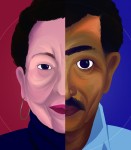Maxine Gordon made a single promise to her late husband.
Jazz musician and Academy Award-nominated actor Dexter Gordon asked his wife to finish his memoir should an event arise that prevented him from doing so. After his sudden death in 1990, that promise structured the next stages of Maxine Gordon’s life as she labored to finish the memoir. Three decades and three degrees later, “Sophisticated Giant: The Life and Legacy of Dexter Gordon” was released. On Wednesday, Maxine Gordon will come to the Schoenberg Music Building for a book talk hosted by the Herb Alpert School of Music to discuss the project. Maxine Gordon said the book’s nonchronological structure mirrors a jazz solo, reflecting her husband’s legacy and impact.
“I knew I didn’t want to write a linear jazz biography. That was very important to me, to make a nonlinear narrative, because jazz is not a linear genre,” Maxine Gordon said. “The story is bigger than (Dexter Gordon) – we needed to tell the story of a culture.”
The book weaves together selections from Dexter Gordon’s unfinished manuscript with the words of other influential figures in the jazz world and those close to him. The narrative mimics the collaborative nature of a jazz composition, Maxine Gordon said. She said she melded her own personal accounts and selections from historical and journalistic archives to attempt to place her husband’s experiences. The complex style differs from many conventional jazz biographies produced by academic scholars. Most biographical books follow a chronological style, which does not authentically capture the legacies of these musicians, she said.
Despite the lack of a clear beginning, middle and end to the story, there is some kind of an arc, said Robin Kelley, a UCLA distinguished professor of history. The biography walks through Dexter Gordon’s life, beginning with Maxine Gordon describing his family, early years and significant moments in his life, such as his drug charges. Kelley said the separate chapters, however, alternate between Maxine Gordon’s search for her husband’s story, her experience with him and the memories of others who knew him. Because she was wife, manager and caregiver to Dexter Gordon, her personal story is woven into the biography, Kelley said.
Around 15 percent of the biography was actually written by Dexter Gordon prior to his death, Kelley said, but other parts by him are also included in his wife’s writing. Dexter Gordon used to write stories on legal pads, and Maxine Gordon took those passages and inserted them into the biography in italics. More of what she wrote came from his voice, while the rest of it came from her own research, Kelley said.
“(The biography) does roam in and out of time, but does so in a way that is engaging, that you can follow and most importantly, never loses the focus on the subject, and that is Dexter Gordon – his life and time, his music and his love,” Kelley said. “It’s not just your typical jazz biography.”
Telling her husband’s story was not always easy, however, Maxine Gordon said. There were parts of Dexter’s life that he kept purposefully absent from his memoir drafts. These years, spent in a Los Angeles prison on drug charges, were the darkest of his life, Maxine Gordon said. This portion of Dexter Gordon’s story, captured in the chapter “Trapped,” required extensive archival research and became the most labor-intensive section of the book, but also the chapter she is most proud of, she said.
After Dexter Gordon left prison, he held a poisoned view of LA, so he left the United States and went to Europe to tour, Maxine Gordon said. Prior to his return to acting ventures in America, Maxine Gordon said he was very successful in Europe.
When Dexter Gordon returned, he made a comeback as a jazz musician in the states and also earned an Academy Award nomination for Best Actor in a Leading Role in “Round Midnight,” said Steven Loza, a UCLA professor of ethnomusicology and chair of the global jazz studies interdepartmental program. Loza said the jazz musician represented the African-American community and culture that jazz stems from. Dexter Gordon fit right into that movement and became one of the jazz leaders, his bluesy style representing the struggle of African-Americans, Loza said.
Maxine Gordon’s book tour will attempt to mirror the geography of her husband’s life, she said. The tour, which begins in LA, will slowly make its way through North America before eventually landing in Europe, mimicking the trajectory of her husband’s life. There was no separation in his personal and professional lives because he was the same man on and off the stage, so it makes sense that his own life would mimic jazz, Maxine Gordon said.
“Most of all, (Dexter Gordon) would like to be remembered as a musician, in a long line of musicians, who added onto and innovated a musical legacy,” Maxine Gordon said. “That’s what jazz is all about, innovating and adding your own take to make the music evolve.”
